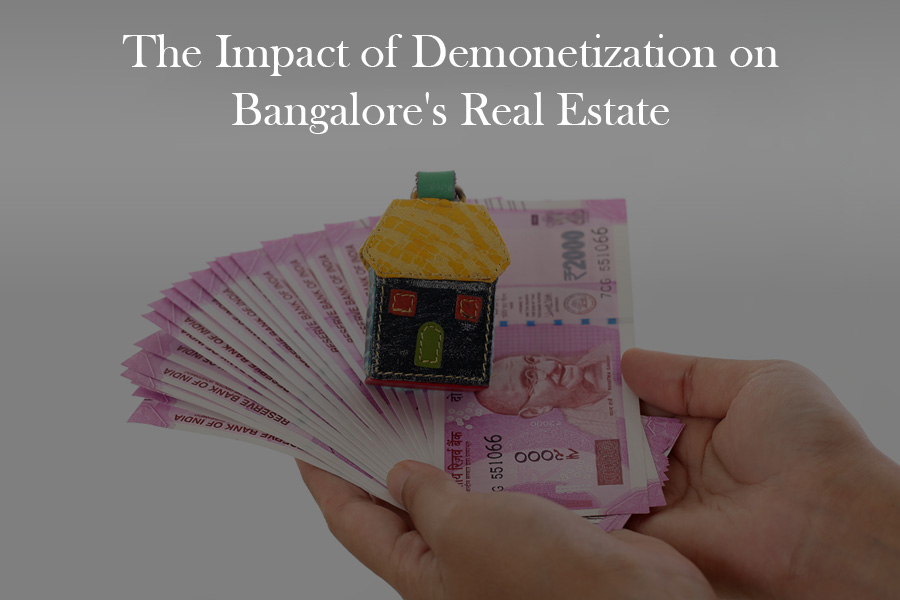The Impact of Demonetization on Bangalore's Real Estate
Read latest blogs and articles from Housystan

The Information mentioned here was last updated on:
29/1/2026The Impact of Demonetization on Bangalore's Real Estate
In 2016, India underwent a significant economic shift with the demonetization drive that aimed to curb black money and promote digital transactions. This policy had a ripple effect across various sectors, notably on real estate markets in major cities like Bangalore. As a hub of technology and innovation, Bangalore's real estate dynamics provide a telling lens into how policy decisions can impact property markets and beyond.
Key Changes Triggered by Demonetization
- Verified Tenants/Buyers
- Unlimited Property Listing
- Zero subscription/charges fee
Decline in Cash Transactions
- Shift to Digital: One of the immediate effects of demonetization was the shift from cash to digital modes of payment. Since real estate, often involving large transactions, was heavily reliant on cash dealings, the high denomination note ban caused a sudden dip in property transactions.
- Decrease in Unaccounted Transactions: The real estate sector, traditionally marked by a large proportion of unaccounted cash transactions, faced a crackdown, leading to increased transparency in dealings and a subsequent slow-down in property sales.
Price Corrections
- Adjustment in Property Prices: The low liquidity due to demonetization forced many sellers to reduce prices, especially those who relied on cash. In Bangalore, this resulted in a notable correction in real estate prices, making properties somewhat more affordable than they were pre-demonetization.
- Greater Bargaining Power: Buyers gained more power in negotiations as developers and sellers were more pressured to close deals given the liquid cash crunch.
Impact on Different Segments
- Luxury vs. Affordable Housing: The luxury segment, which had a higher tendency of cash involvement, saw a starker impact compared to the affordable housing sector. In contrast, affordable housing projects, which benefited from government incentives and financial ease, continued to draw interest.
Boost to Formal Transactions
- Increased Reliance on Banking Systems: The formal banking sector saw more engagement as customers turned to loans and formal credit to finance real estate purchases, making the economy more regulated and transparent.
Long-term Effects on the Market
Enhanced Transparency
- Documentation and Legalities: With demonetization, there was an increased emphasis on proper documentation and adherence to legal norms in property transactions. This led to a more controlled and transparent market.
Greater Use of Technology
- Digital Platforms Surge: Real estate firms and brokers embraced digital platforms for transactions. Technology became a key player, enabling smoother, faster, and more secure property dealings.
Realignment of Investment
- Investor Shift: Prior to demonetization, many investors looked to the real estate sector as a means of parking unaccounted wealth. Post-demonetization, a shift was noticed toward more transparent means of investment, such as regulated markets and tax-compliant investments.
Government Initiatives
- REITs and Affordable Housing Push: Demonetization acted as a catalyst for policy initiatives such as the introduction of Real Estate Investment Trusts (REITs) and impetus to the Pradhan Mantri Awas Yojana, aligning well with the ‘housing for all’ vision.
Impact on Bangalore’s Growth Areas
Emerging Localities
- Infrastructure Development: Areas like Whitefield, Electronic City, and Sarjapur Road continued to thrive owing to significant IT infrastructure and employment opportunities that maintained property demand despite temporary market slumps.
- Growth in Peripheral Regions: The policy nudged developers to explore peripheral regions, leveraging cheaper land and planning more budget-friendly projects, thereby supporting urban sprawl and development of suburban zones.
Impact on Rental Markets
- Stabilized Rent Prices: Although property buying saw fluctuations, the rental market remained fairly stable, proving the continuous demand for housing especially by the city's vast population of professionals.
Prospective Changes in Buyer Sentiment
Buyer Preferences
- Sustainable Housing: Post-demonetization, there's a noted increase in demand for sustainable and eco-friendly housing solutions, as buyers value long-term benefits over initial profitability.
- Preference for Ready-to-Move: Given the cash crunch, more buyers shifted focus from under-construction properties to ready homes, mitigating risks associated with project delays or financial uncertainty.
Given these insights, the effects of demonetization reached far beyond immediate financial scenarios, influencing buyers, sellers, and developers in lasting ways. Understanding these impacts helps stakeholders and new entrants navigate Bangalore's dynamic real estate landscape with a forward-looking approach, aligning with transparency and digital advancements.